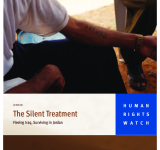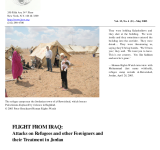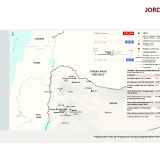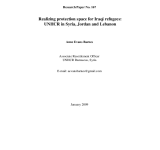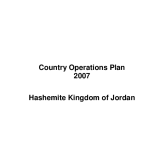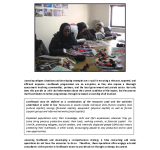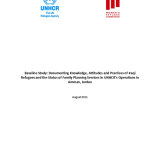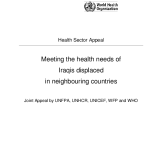UNHCR
Attacks and harassment amidst the security vacuum in Iraq forced refugees and other foreigners to flee the country and become refugees again;; this time in Jordan. Based on research in Baghdad and Jordan;; this 22-page Human Rights Watch report details the abuses against refugees and foreigners in Iraq;; as well as their treatment upon arrival in Jordan. Housing is frequently the pretext for the violence and harassment. Many landlords;; forced by the previous government to take Palestinian tenants at discounted rates;; are taking advantage of the breakdown in law and order to evict Palestinian tenants from their homes or to extort unrealistic rent increases from them. In other cases;; violence and threats have come from individuals who seem to have no legitimate claim to the property. Human Rights Watch criticized Jordanian authorities for limiting refugees' entry to Jordan and recommended that Jordan provide immediate protection and assistance to all refugees;; including those currently trapped near the Jordanian border in accordance with international refugee law standards.
This report outlines the regional response plan to Syrian refugees. It gives an overview of the situation of Syrian refugees in Jordan;; the plans and strategies that have be put in place to accommodate them. The overarching priorities in 2013 remain the registration and documentation of new arrivals;; basic protection;; and life-saving activities;; specifically: the establishment of adequate camp infrastructure;; provision of non-food items (NFI) to new arrivals in camps;; access to health care;; food assistance;; access to clean water in camps;; and physical protection including response to and prevention of sexual and gender-based violence (SgBV). Other essential activities include the identification and protection of unaccompanied and separated children (UA/SC);; access to education services and subsistence aid to the most vulnerable among the non-camp refugee population;; and improving access to water in refugee- hosting communities.
This paper looks at how UNHCR has gone about creating;; maintaining and expanding protection space for Iraqi refugees in the context of the Jordan;; Syria and Lebanon. The paper is divided into two parts. The first touches on UNHCR's mandate and the 1951 Convention Relating to the Status of Refugees;; which together provided;; for the first time;; a formal structure for the protection of refugees under international law. The second part of the paper turns attention to the Iraqi displacement to Syria;; Jordan and Lebanon. It begins by outlining the protection environment as regards refugees in the region and indicates the protection needs faced by Iraqi refugees;; or rather rights which remain be realized by Iraqi refugees in these countries.
This document by the United Nations High Commissioner for Refugees (UNHCR) outlines Jordan operations plan for the year 2007. It stars with an overview of the operational environment including the number and characteristics of UNHCR beneficiary population;; and moves on to outlining operational goals.
Assessing refugee situations and developing strategies are crucial in ensuring a relevant;; targeted;; and efficient response. Livelihoods programmes are no exception;; as they also require a thorough assessment involving communities;; partners;; and the local government and private sector. Not only does this provide us with vital information about the current condition of the region;; but the process itself contributes to better programmes through increased ownership of all involved. UNHCR Jordan developed a quality strategy using their internal resources and networks. This is a story about their experience and the lessons learnt in the process.
This report addresses a family planning (FP) study undertaken by the United Nations High Commissioner (UNHCR);; the Women's Refugee Commission (WRC) and the Centers for Disease Control and Prevention (CDC) among Iraqi refugees in Amman;; Jordan in June-July;; 2011. It documents the knowledge;; beliefs;; perceptions and practices of refugees;; as well as the state of service provision to improve programming and subsequently increase uptake of good quality FP services among Iraqi women;; men and adolescents.
This joint interagency appeal to the international community seeks a total of US$ 84;;833;;647 million to provide support to national efforts aimed at improving access to health care for displaced Iraqis living in Syria;; Jordan and Egypt. The activities prioritized in the appeal are based on the Common Action Framework agreed upon during the Ministerial Consultation to Address the Urgent Needs of Displaced Iraqis;; convened by WHO in Damascus from 29-30 July 2007.
